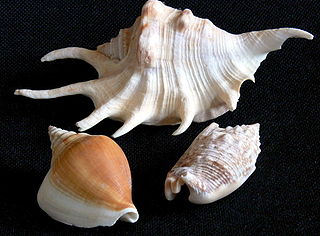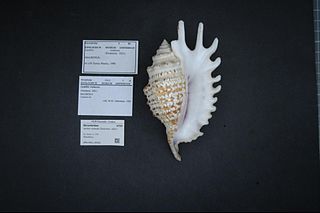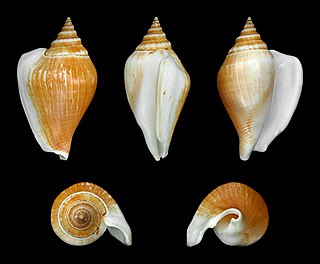
Strombidae, commonly known as the true conchs, is a taxonomic family of medium-sized to very large sea snails in the superfamily Stromboidea, and the Epifamily Neostromboidae. The term true conchs, being a common name, does not have an exact meaning. It may generally refer to any of the Strombidae but sometimes is used more specifically to include only Strombus and Lambis. The family currently includes 26 extant, and 10 extinct genera.

Strombus is a genus of medium to large sea snails, marine gastropod molluscs in the family Strombidae, which comprises the true conchs and their immediate relatives. The genus Strombus was named by Swedish Naturalist Carl Linnaeus in 1758. Around 50 living species were recognized, which vary in size from fairly small to very large. Six species live in the greater Caribbean region, including the queen conch, Strombus gigas, and the West Indian fighting conch, Strombus pugilis. However, since 2006, many species have been assigned to discrete genera. These new genera are, however, not yet found in most textbooks and collector's guides.

Ophioglossolambis violacea is a species of large sea snail, a marine gastropod mollusk in the family Strombidae family, the true conchs and their allies.

Lambis is a genus of large sea snails sometimes known as spider conchs, marine gastropod mollusks in the family Strombidae, the true conch family.

Lobatus is a genus of very large sea snails, marine gastropod mollusks in the family Strombidae, the true conchs. Some of the species within this genus were previously placed in the genus Eustrombus.

Titanostrombus goliath, previously known as Lobatus goliath and Strombus goliath, common name the goliath conch, is a species of very large edible sea snail, a marine gastropod mollusk in the family Strombidae, the true conchs. T. goliath is one of the largest mollusks of the Western Atlantic Ocean, and also one of the largest species among the Strombidae. It was once considered endemic to Brazil, but specimens have also been recently found in the waters of Barbados. Brazilian common names for this species include búzio de chapéu or búzio, and búzio de aba or buzo in. Some phylogenetic hypotheses consider T. goliath as closely related to the queen conch, Aliger gigas.

Aliger gallus, previously known as Strombus gallus, common name the rooster conch or rooster-tail conch, is a species of medium-sized sea snail, a marine gastropod mollusk in the family Strombidae, the true conchs.

Ophioglossolambis digitata is a species of sea snail, a marine gastropod mollusk in the family Strombidae, the true conchs.

Canarium urceus is a species of sea snail, a marine gastropod mollusk in the family Strombidae, the true conchs.

Aliger is a genus of sea snails, marine gastropod mollusks in the family Strombidae, the true conchs.

Varicospira is a genus of sea snails, marine gastropod mollusks in the family Rostellariidae within the Stromboidea, the true conchs and their allies.

Laevistrombus is a genus of sea snails, marine gastropod mollusks in the family Strombidae, the true conchs.

Dolomena is a genus of sea snails, marine gastropod mollusks in the family Strombidae, the true conchs.

Margistrombus is a genus of sea snails, marine gastropod mollusks in the family Strombidae, the true conchs.

Doxander is a genus of sea snails, marine gastropod mollusks in the family Strombidae, the true conchs.

Laevistrombus turturella is a species of sea snail, a marine gastropod mollusc in the family Strombidae. It is one of seven living species currently recognized as valid in its genus.
O. digitata may refer to:

Striatostrombus is an extinct genus of fossil sea snails, marine gastropod mollusks in the family Strombidae, the true conchs.
Thetystrombus is a genus of sea snails, marine gastropod mollusks in the family Strombidae, the true conchs.
Ophioglossolambis itsumiae is a species of true conch from the Mascarene Islands and Saint Brandon Shoals in the western Indian Ocean. It was described in August 2021.
















